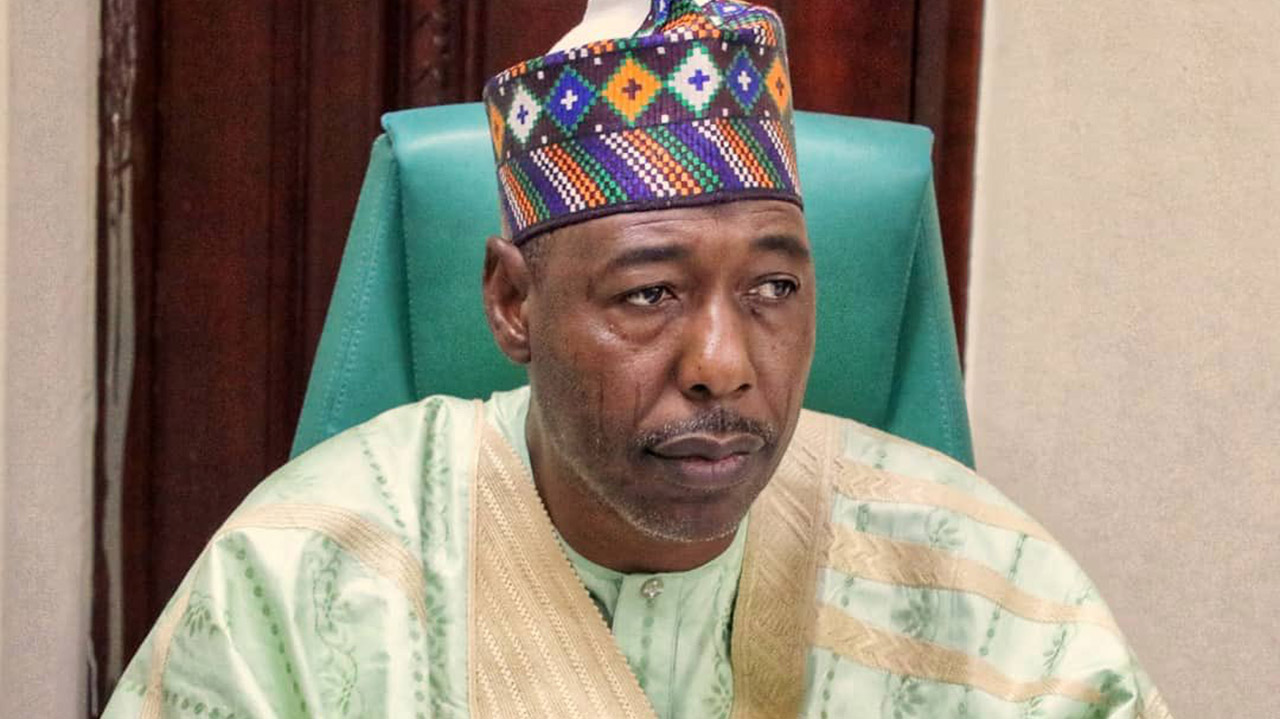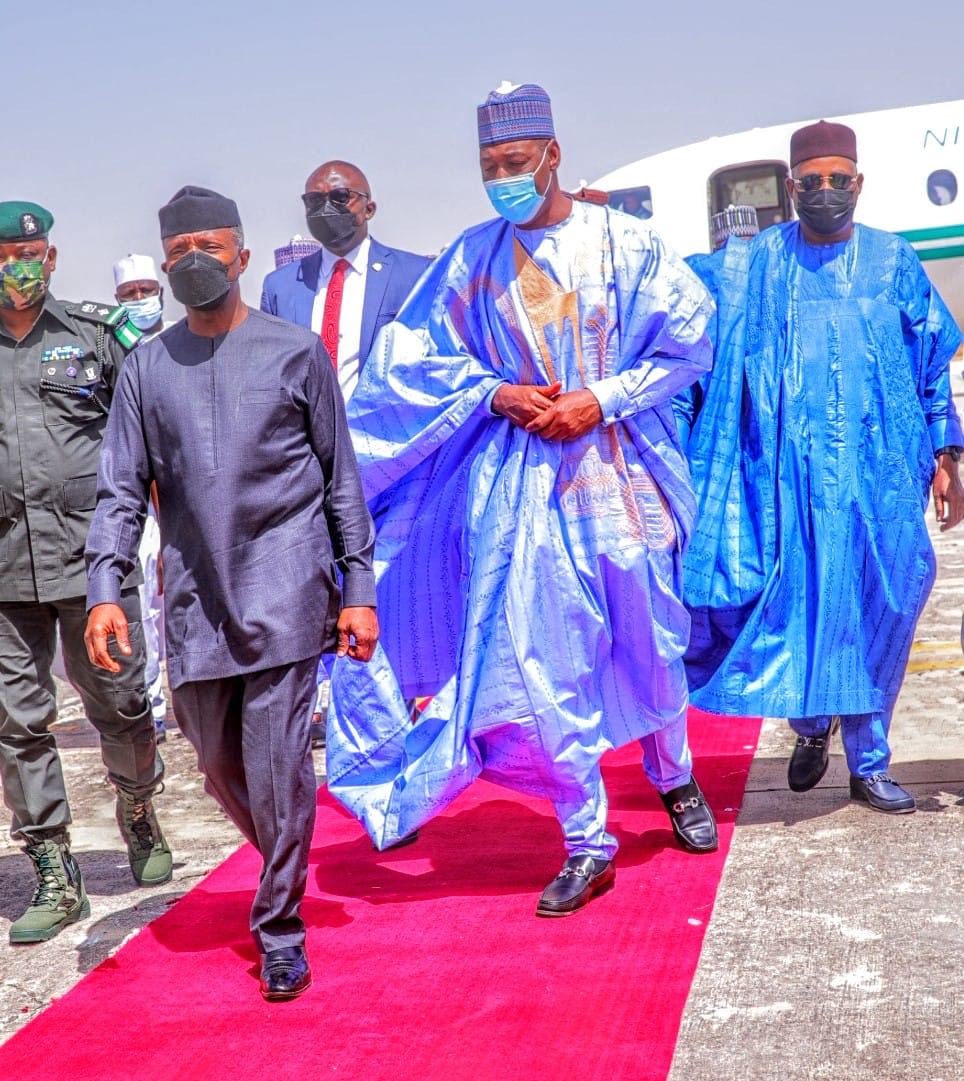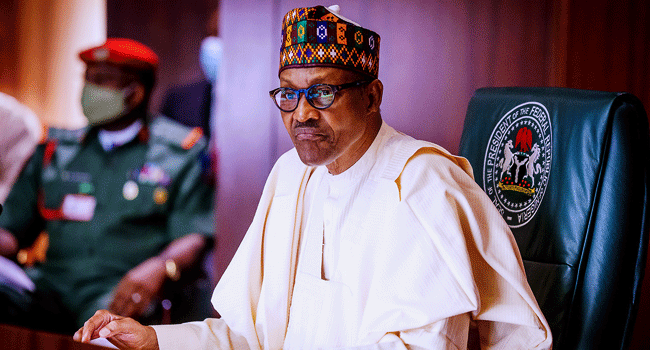August 1 Protesters Give Tinubu Tall Order; Read The Long List of Their Demands:
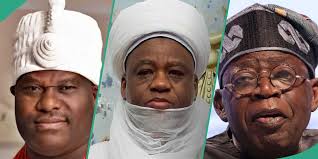
Key points:
- There are different promoters asking for different things from Tinubu government
- They are faceless but vibrant on X, TikTok, Facebook, Instagram
- Some posts are in vernacular to target the masses
- FG enlists traditional rulers, political leaders, security agencies to frustrate protests
By Emmanuel Kwada
Promoters of the upcoming August protest are calling on the Tinubu administration to reverse the fuel pump price to ₦100 per liter, according to a flyer circulating on Twitter.
The flyer, tagged ‘Extract of our demand’, outlines the key grievances of the protest organizers and can be seen on the Twitter handles @YeleSowore, which has a large following of 973,000 users. Notably, Arewa Twitter (@ArewaaConnect), a handle with a significant following of 108,000, has broken its silence after remaining inactive during the eight-year tenure of former President Buhari.
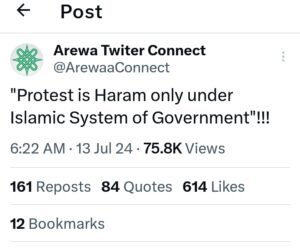
The handle is now urging its supporters to take to the streets in protest, clarifying that protest is only considered ‘haram’ (forbidden) under an Islamic government.
Other influential handles; Queen Bee (@RealQueenBee_), with over 40k followers, @General_Oluchi with a substantial following of 231,000, @FlagboyFCTAbuja with 8,399 followers, and @biafra_daily, with 9,073 followers is actively promoting the protest and issuing a warning: if any protesters are arrested, hurt, or killed, the demands will change to ‘Tinubu Must Go’. This suggests a growing sense of urgency and frustration among certain segments of the population, with social media playing a key role in mobilizing and amplifying dissenting voices.
If any protesters are arrested, hurt, or killed, the demands will change to ‘Tinubu Must Go’.
Significant segment of the population is calling on the government to take decisive action against the twin scourges of insecurity and hunger. This demand is prominently featured on various Twitter handles, reflecting the deep-seated concerns of individuals from all states and the FCT.
The overwhelming support for this demand on social media highlights the gravity of the situation and the need for the government to respond with effective solutions to guarantee the security and welfare of its citizens.
Some individuals are advocating for a comprehensive electoral reform, an independent investigation into the electoral budget of ₦355 billion, and the immediate release of all EndSARS protesters still in detention.
They are passionately calling for a thorough overhaul of the electoral system to ensure transparency and accountability, a probe into the electoral budget to prevent mismanagement and corruption, and the release of protesters who were arrested during the EndSARS movement, which sought to end police brutality and promote social justice.
A significant segment of the population is advocating for a comprehensive overhaul of the education system and economic policies in Nigeria.
Their demands which are visible on some placards flying on social media include:
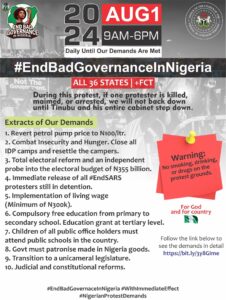
- Mandatory free education from primary to secondary school levels, ensuring that every child has access to quality education regardless of their background or financial situation.
- Education grants for students pursuing tertiary-level education, enabling them to acquire higher learning without being burdened by financial constraints.
- A requirement for children of public office holders to attend public schools in Nigeria, promoting accountability and equality in education. This measure aims to ensure that those in power are invested in the quality of public education, as their own children would be directly impacted.
- A commitment from the government to actively promote and procure goods manufactured in Nigeria, thereby supporting local industries and stimulating economic development. This demand seeks to reduce reliance on imported goods and foster a sense of national pride in Nigerian products.
The protesters are seeking to address systemic inequalities and promote a more inclusive and self-sufficient society, where education is accessible to all and the government support domestic industries.
Remarkably, some individuals are advocating for a fundamental transformation of Nigeria’s governance structure, as evident from the demands displayed on placards circulating online. These demands include:
- Transitioning to a unicameral legislature, which would merge the current bicameral system of the Senate and House of Representatives into a single legislative chamber. This aims to streamline governance, reduce costs, and enhance efficiency.
- Comprehensive judicial reforms, targeting the overhaul of the country’s legal system to ensure swift, fair, and accessible justice for all citizens
- Constitutional reforms, seeking to review and amend the nation’s founding document to address pressing issues, promote national unity, and entrench democratic principles.
“Muye Zanga Zanga”
Additionally, a significant number of individuals, particularly from the northern region of Nigeria, are also clamoring for an end to bad governance. They are vocally expressing their discontent through various means, including the phrase “Muye Zanga Zanga” which translates to “Let’s Protest” in Hausa.
This rallying cry has been transformed into music and videos, which are being widely shared on social media platforms like TikTok, facebook, X, and others. By leveraging the power of music and social media, these individuals are amplifying their message and mobilizing support for change, underscoring the widespread frustration with the current state of governance in Nigeria.
The demand for a fuel price reduction is a central rallying point for the protest, which is expected to take place in various locations across the country. By sharing the flyer on social media, the organizers aim to mobilize support and raise awareness about their demands, putting pressure on the government to take action.
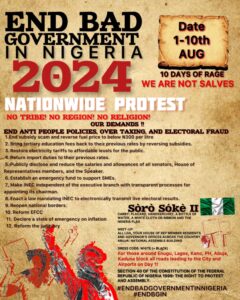
Conversely, certain flyers feature encrypted messages outlining a set of demands, including:
- Put an end to the subsidy scam, which has been draining the nation’s resources.
- Reopen national borders to facilitate trade and economic growth.
- Declare a state of emergency on inflation to address the rising cost of living.
- Establish an emergency fund to support Small and Medium Enterprises (SMEs) and stimulate economic development.
- Publicly disclose and reduce the salaries of Senators and members of the House of Representatives to promote transparency and accountability.
- Restore import duties to their previous rates to protect local industries and jobs.
- Return electricity tariffs to affordable levels, ensuring that the public has access to reliable and affordable power.
- Reform the Economic and Financial Crimes Commission (EFCC) to enhance its effectiveness in combating corruption.
- Make the Independent National Electoral Commission (INEC) truly independent of the Executive branch, with a transparent process for appointing its chairman to ensure free and fair elections.
These demands, prominently displayed on online placards, reflect a desire for sweeping reforms to address the country’s economic, political, and social challenges in Nigeria.
Another flyer circulating online, encrypted for emphasis, delivers a scathing message:
“Nigerians, wake up! The government claims ‘No Money’, but the truth tells a different story:
- Despite the supposed lack of funds, N50 billion was spent on 469 SUVs for National Assembly members.
- Amidst economic hardship, N21 billion was allocated for the Vice President’s residence.
- A staggering $38 million was spent on a presidential yacht.
- Plans are underway to acquire a $100 million presidential jet.
- The fuel subsidy was removed, but where is the money saved from this move?
- The government continues to take out loans, but where is the money going?
- Value-Added Tax (VAT) has been increased, yet again, without transparency on how the funds are being utilized.
The flyer concludes with a strong warning: ‘ZERO EMPATHY. We will hold all of you accountable.’ This message highlights the perceived disconnect between the government’s claims of financial constraint and the lavish spending on non-essential items, sparking outrage and demands for accountability.
Meanwhile, President Tinubu has been engaging in a series of meetings with various stakeholders, including state governors, particularly those from the All Progressives Congress (APC). He has also held discussions with traditional and religious leaders, such as the Ooni of Ife, Sultan of Sokoto, as well as security chiefs like the National Security Adviser (NSA), Inspector General of Police (IGP), and Minister of Defense.
Furthermore, President Tinubu has dispatched some ministers to different states to persuade people and other religious leaders to reconsider or cancel the planned protest. These efforts suggest a concerted attempt by the President to build consensus, address concerns, and potentially mitigate the impact of the upcoming demonstrations.
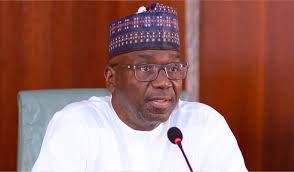
Gov AbdulRazaq, Chairman of Nigeria Governors Forum Source: Vanguard Online
The promoters of the August protest have yet to articulate a unified set of demands, as a diverse array of placards, flyers, and write-ups are circulating on social media. This lack of clarity contrasts with the 2020 EndSARS protests, where demonstrators were singularly focused on ending the brutality and abuses perpetrated by the Special Anti-Robbery Squad (SARS).
The current protest movement appears to encompass a broader range of grievances, with various groups and individuals expressing their discontent through different slogans and messages. This diffuse nature of the protest demands may reflect the complexity and multiplicity of issues plaguing the country, but it also risks diluting the movement’s impact and momentum.
Give President Tinubu more time to tackle the pressing issues.
Other traditional rulers, particularly from the Southwest region, have urged the youths to abandon the planned protest and give President Tinubu more time to tackle the pressing issues.
In a similar vein, traditional rulers in Lagos have announced the commencement of the Ororo festival on August 1st, cautioning non-indigenes to steer clear of the area during the festivities.
This move is seen as another strategy to dissuade people from participating in the protest, as the festival will likely attract large crowds and potentially divert attention away from the planned demonstrations. By leveraging cultural events and traditional influence, these leaders aim to calm tensions and buy time for the government to address the grievances driving the protest.
Muslim-Muslim ticket has proven to be a disastrous choice
Meanwhile, a significant number of Northern religious and traditional rulers are expressing their outrage and frustration, actively encouraging the protest.
They assert that the Tinubu government has failed miserably, and that the Muslim-Muslim ticket has proven to be a disastrous choice, exceeding their worst expectations.
In a remarkable turn of events, some religious leaders who previously declared that protesting was ‘haram’ (forbidden) during the eight-year tenure of former President Buhari are now vocally stating that protest is not haram.
This sudden shift in stance suggests a growing discontent with the current administration and a willingness to challenge its authority, highlighting the depth of frustration and disillusionment among certain segments of the population.

However, in a contrasting stance, the Police, Military, and Department of State Services (DSS) have issued a stern warning, stating that they will not tolerate any violent protests, implying a zero-tolerance policy for any form of unrest or civil disturbance. This sets the stage for a potential showdown between protesters and security forces, highlighting the tensions and uncertainties surrounding the upcoming demonstrations.
Read Also: Tinubu’s 12 Long And Short Leap In First Year
The Insight Report
Nigeria Coverage

